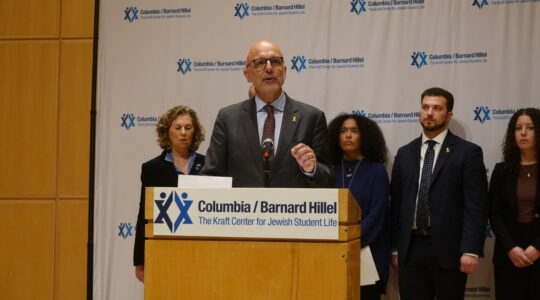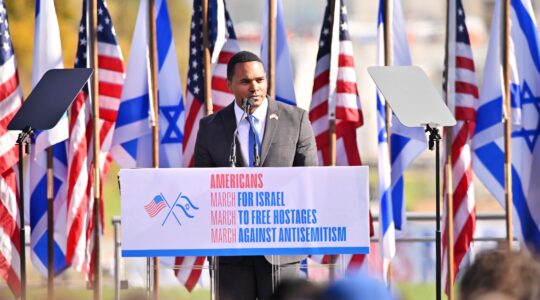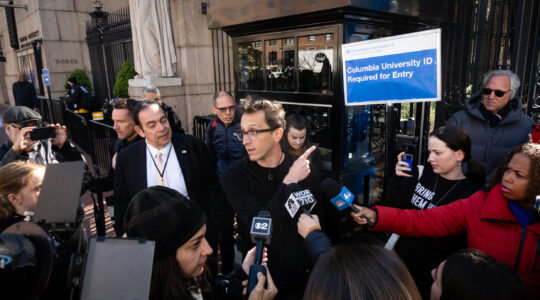As the Bush administration considered this week cutting financial assistance to Israel to protest the fence being built in the West Bank, Israeli officials and members of Congress blasted the idea.
“We are not going to give up on our security,” said Natan Sharansky, Israel’s minister for Jerusalem and Diaspora Affairs.
In a phone interview, Sharansky said the fence is necessary to protect Israelis from terrorists infiltrating from the West Bank. He noted that although the fence was endorsed initially only by the left in Israel, it received broader support about 18 months ago after Defense Minister Shaul Mofaz said that without it Israel would have to maintain a “much larger army to protect citizens from terrorist attacks.” Polls now show that 80 percent of Israelis support the fence.
National Security Adviser Condoleezza Rice reportedly has told Israel that the issue of deducting the cost of the fence from the $9 billion in loan guarantees over three years and the $1 billion in military aid is not an option currently before President Bush. But deputy State Department spokesman Philip Reeker told reporters Monday that the matter was under discussion.
Palestinian representatives and Mideast groups that have been critical of Israeli policy have been flooding the White House with information about the route of the fence, which they say intrudes deeply into some West Bank areas.
Israel last week certified the completion of 85 miles of the proposed 380-mile barrier, which includes an electrified fence, ditches, electronic monitors and a wall in areas where terrorists have shot at Israelis. Construction costs are put at about $2 million a mile.
The Bush administration has signaled that construction of the barrier becomes a problem when it turns into a West Bank land grab.
In a radio broadcast to the Arab world Monday, Secretary of State Colin Powell spelled out the administration’s concerns, saying: “A nation is within its rights to put up a fence if it sees the need for one. In the case of the Israeli fence, we are concerned when the fence crosses over on to the land of others.”
His comments echoed those of Palestinians who maintain that the fence is cutting through their land, separating them from their fields, jobs and, in some cases, their neighbors.
But Rep. Jerrold Nadler of Manhattan, in a phone interview from Israel, where he is visiting this week with 28 other House Democrats — the largest-ever congressional delegation to visit Israel — said such talk does not reflect reality.
“It is not their territory,” he said of the Palestinians. “It is disputed territory until there is an agreement. They have to negotiate secure borders, and Israel has said the fence is not a border. Israel has said that if the Palestinians don’t stop terrorist raids from the territories, [the Palestinians] would have to pay the price.”
Congress approved the loan guarantee and military aid to compensate Israel for the economic impact of the war with Iraq.
The language of the loan guarantee provides for a “dollar for dollar” cut in the assistance to offset construction in the territories that is unrelated to security. It would be up to the president to decide whether the fence qualified as a security barrier.
Sharansky said he did not believe the Bush administration would “pressure us” over the fence.
“But if it wants to punish us and demand that we risk the lives of citizens, we would still have to [build] it,” he insisted. “We have no choice. The obligation of the government is to protect its citizens from terror. We have a total war with the Palestinian Authority.”
At the heart of the dispute is a proposal to swing the fence deep into the West Bank in order to encompass the 20,000 Jewish residents of Ariel. Ron Nachman, the mayor of Ariel, told The Jewish Week that he was certain Ariel would be “included within the fence, as it was even in the agreement between [former President Bill] Clinton and [former] Prime Minister [Ehud] Barak” during talks at Camp David in July 2000.
“The fence emerged from the needs of the State of Israel to protect against terrorists, otherwise there would be no fence,” Nachman explained. “The people of Ariel deserve the same rights as the people of Tel Aviv, and I will not tolerate inequality.”
“The minister of defense told me it was the plan [to include Ariel] and no one has changed it,” he added. “I trust the minister of defense and the prime minister of Israel, and I’m sure they will protect us exactly as President Bush protects the United States.”
Nadler said that not only should Bush reject any suggestion that American financial assistance be reduced to Israel because of the fence, but he should “fire those who give such advice because it shows they don’t know what’s going on.”
Nadler also was incredulous with the notion that the Bush administration might punish Israel for building the fence.
“It’s OK for the U.S. to invade Afghanistan and Iraq and to say Israel can’t build a fence to stop terrorists from coming in?” he asked. “It’s hypocritical for us in the extreme to oppose the security fence. Is it better that Israel reinvade and occupy all of the territory?”
Several other members of Congress, including Democratic Sens. Charles Schumer of New York and Joseph Lieberman of Connecticut, also issued statements opposing the proposed aid cutback. And Rep. Nita Lowey of Manhattan and the Bronx, also a Democrat, wrote to Bush to express her “grave concern” about the matter.
“The U.S. must never pressure Israel to take a position or action which would jeopardize the security of its citizens,” Lowey wrote.
Amid the discussion about the fence, Israel went ahead Wednesday with the release of more than 300 Palestinians who were imprisoned for security reasons or held for administrative detention. Another 100 prisoners were slated to be released at a later date.
Although their release was not a provision of the “road map” aimed at establishing a Palestinian state by 2005, Israeli officials said they took the action to help boost the stature of the new Palestinian prime minister, Mahmoud Abbas.
Hamas and Islamic Jihad, which on June 29 declared a unilateral three-month cease-fire conditioned in part on the release of Palestinian prisoners, hailed the release but said all Palestinian prisoners must be set free.
Abbas canceled a meeting with Sharon in protest over the prisoner release. PA officials called the move a sham, claiming most of the prisoners were scheduled to be freed anyway. Palestinians claim Israel is holding more than 7,000 prisoners; Israel says the number is closer to 6,000.
Sharansky insisted the Palestinian Authority still has not made the first move to dismantle the terrorist infrastructure as called for in the road map. Such steps would include arresting terrorists, confiscating their weapons, destroying factories that build Kassam rockets and halting weapons-smuggling operations.
“Not only are they not doing it, they are saying they are not going to do it,” Sharansky said, referring to Abbas’ claim that such a crackdown would only lead to a Palestinian civil war.
Abbas, in his meeting with the congressional delegation, contended that the cease-fire was the first step toward dismantling the terrorist organizations, according to Nadler.
“He said [Palestinians] must have one authority and one security force and one law and one force with weapons,” Nadler said. “He said that is our goal and we will do it and without the use of force.”
But Sharansky pointed out that even in areas in which the Palestinians have control, such as Bethlehem, terrorists are still free to roam. He cited the terrorist shooting Sunday night of a family driving from the southern Jerusalem neighborhood of Gilo to Efrat.
Zila Hayoun, 39, was critically wounded by a gunshot wound to her chest. Her 9-year-old daughter was shot in the leg; her two other children were treated at the scene.
“The shooting was practically in Jerusalem from areas where the Palestinian Authority said there would be no more shooting,” said Sharansky. “And the responsibility for the shooting was taken by the Fatah [movement] of the Palestinian Authority! So they have made very clear to us that the cease-fire depends on Israel’s behavior and that they are not going to dismantle [the terrorist infrastructure].”
Abbas met with representatives of Hamas and Islamic Jihad this week and they reportedly agreed to continue the cease-fire. Israel rejected a Palestinian offer of a “permanent truce,” and announced after Sunday’s shooting that it would not continue turning over areas of the West Bank to Palestinian control until the PA begins dismantling the terror groups.
Washington correspondent James D. Besser contributed to this report.




